by Marino – Brad Lynch on December 27, 2023
Meghna is here to share with us which games deserve to be celebrated in this tumultuous year for the industry.

Meghna Jayanth is a writer and narrative designer for games such as Thirsty Suitors, 80 Days, Horizon Zero Dawn, Sable, and Boyfriend Dungeon.
I’m increasingly convinced that just as dreams are the way our embodied selves process being awake, video games help us cope with our real lives inside the spectacular horror of capitalism-colonialism. The false promises and deferred satisfactions of neoliberalism, mostly shallowly distracted from or traumatically re-enacted. But – when a game manages to sensitise us rather than numb us, awaken us, or give us a space for communion in defiance of atomization, it is to be celebrated. In the shadow of corporate mergers, increasing financialisation, funding squeezes and mass layoffs in the games industry, we can see the space for this kind of work and creativity shrinking. This should be alarming to anyone who cares – about the medium, and about people, and the world. We need this kind of experimentation and boundary-breaking, this cracking and remaking of worn-out ideas and dead perspectives. We need work which refuses the corporate demand to be content. We live in a world of impending climate collapse, our reality is the global rise of fascism and authoritarianism, pandemic and scrollable genocide [https://stevesalaita.com/scrolling-through-genocide/]. The old order is collapsing and the new is yet to be born. In this roiling, anxious, paranoid, possibility-filled atmosphere the games industry’s march towards cultural dominance seems unstoppable. I for one would prefer we didn’t march there in goose-step. This moment has no use for artistic cowardice.
10. Cocoon
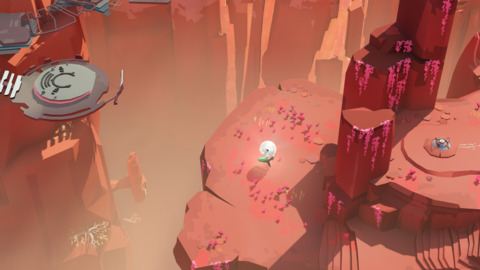
I adore elegant design and an approachable puzzle-game; Cocoon is in some ways made for me. It’s more interested in being personable, and giving a rich return to the player who chooses to spend time with it – audiovisually, texturally, mechanically – than it is in convincing you it’s clever, or making you feel clever. To me, that is to its credit. It’s beautiful in the manner of a Faberge egg – a work of intricate, intentional design eager to open itself up for your delectation. The masochists amongst you may not appreciate its easy pleasures.
9. Chants of Sennaar

The love-child of Heaven’s Vault and Sable, though maybe that’s my own context speaking. It’s a puzzle game about language and interpretation, irresistible to the sort of person who enjoys a game which entices you to get out a notebook and pencil. It frustrated me delightfully.
8. Against the Storm
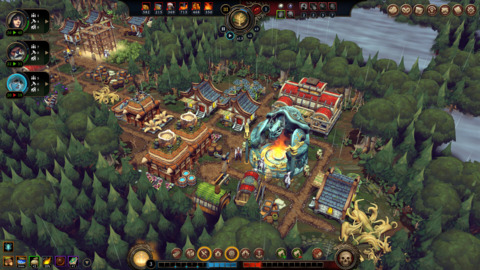
I’ve only just started playing this on a friend’s recommendation and I’m obsessed. It’s a roguelite city-builder in a high fantasy setting. The task is to build a series of settlements for a demanding sorcerous Queen in the face of apocalyptic storms. Failure is inevitable. Your boss will never be satisfied. All your great works shall return to dust. The project of civilization is futile in the face of our own hubris and nature’s fury. A little light escapism for the secret doomer that takes over your brain at 2am! Look, playing this game is more socially acceptable than prepping, so. You know. There’s that.
7. I Was a Teenage Exocolonist
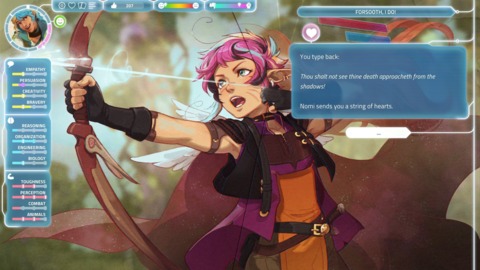
Didn’t come out this year, but I finally played it a few months ago and it deserves more love. It’s part colony sim, part visual novel, part dungeoneering, part card game wrapped up in a far future coming-of-age story. A compulsive core game loop and elegant UI make Exocolonist a very more-ish experience. It’s young adult in the best sort of way – the game situates the player with an authentically teenage curiosity about the world and systems and figuring out your path through the spread of possibility laid before you, but it doesn’t shy away from big ideas and critiques, and grief and loss. A very human sci-fi drama that is also in some ways a defiant elegy to the political failures of our present moment – the collapse of all that we know as fertile soil for future possibility.
6. Saltsea Chronicles

This is a game about community and mutuality, rather than lone heroes – and every narrative and design choice reflects this fundamental theme. You play as the crew of a ship whose captain has gone missing, triggering a storm-tossed adventure across the various islands of this post-post-apocalyptic setting. What is a post-post-apocalypse, I hear you ask? It’s about what happens after the world ends, when the survivors band together to build something new with the remnants and relics of the past. Saltsea is set here to allow the team to imagine alternate futures and possibilities, ways of organising communities and societies which feel so pleasurable to visit whilst in the totalising grip of capitalist-colonialist systems. Just for this act of revolutionary and transformative imagination, Die Gute Fabrik should be commended. That all of this is delivered through a cast of compelling characters and an innovatively responsive system of choice-design and mood-and-event tracking makes for a fascinating game which lives up to its own promise. Truly charming.
5. Venba
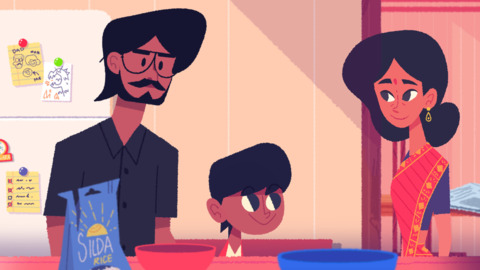
Piece together recipes and cook delicious dishes to unfurl a narrative about an Indian woman immigrating to Canada in the 1980s, and raising a family. This game has heart; at its best its mechanics, narrative and pacing all come together to deliver some real emotional gut-punches. I’ve recommended Venba to several friends now, and every single one of them texted back to tell me that this game made them cry. Everything about this game is studiedly nostalgic for me as a South Indian – the objects in Venba’s home, the radio soundtrack which is an homage to Tamil music of the 80s and 90s, the soundscape of the kitchen and its familiar utensils, certain turns of phrase. Representation is basic – but it’s powerful. To have Thirsty Suitors and Venba come out in the same year is deeply moving. They’re both games about the South Asian immigrant experience and about cooking as intergenerational connection, but they couldn’t be more different in tone, style and approach – which really showcases the richness and sheer variety of experience that is possible outside of the creative shackles of whiteness and patriarchy. We need more people to fund this kind of work, play it, support it, champion it. Play this game especially if you aren’t South Asian, or an immigrant, or a mother. You might find it’s exactly to your taste.
4. Highland Song
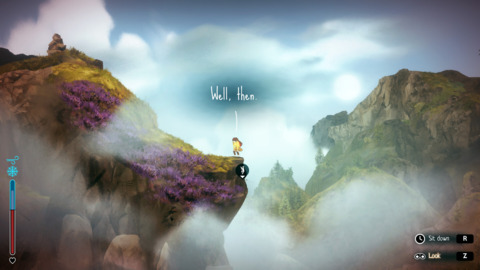
Highland Song is a riff on a classic inkle trope, the fragile body on perilous adventure. Yes, this game can be punishing with its health-sapping rain, crushingly inevitable day-night cycles, and stamina bar which dwindles as Moira climbs and teeters across the Scottish Highlands, but the adventure is only thrilling because it is perilous. I’m biased when it comes to inkle studios. 80 Days was my first professional job in the games industry. Collaborating with them has been a singular pleasure of my career, and Jon Ingold – inkle’s cofounder – taught me more about narrative design than I’ve managed to glean in all the time after. Highland Song is a bravura achievement. As a demonstration of the versatility and importance of their design thinking and the power of the ink engine to video games as a whole, rather than just text games – it’s an unquestionable success. Highland Song is a survival platformer floating atop an intricate edifice of systemic narrative design, which responsively enlivens the landscape the player traverses with magic – which is to say, with story. It’s a platformer haunted by interactive fiction. It’s a ghost story systems designers tell each other around procedurally generated campfires. These highlands are full of noises.
3. Mediterranea Inferno
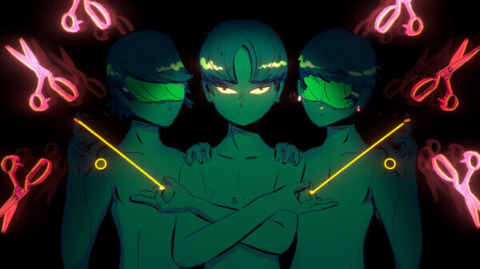
I played this in a fevered haze a few days after the ceasefire in Gaza collapsed. Mediterranea Inferno is a gorgeously stylish piece of interactive art about three club twinks on holiday in Puglia after the end of the Covid lockdowns. The Sun Guys are plagued by anxiety, ennui and phantasmagoric mirages that promise them bliss but are ordered by the extractive design principles of hypercapitalism. Pay SunCoins to self-actualise. The narrative tends linear, arguably it’s a type of visual novel – but it deploys just enough mechanical design to give the story a feeling of momentum and propulsion. A single playthrough is possible in a couple of hours, though alternate possibilities reveal themselves on replay. This game is effortlessly cool, yes, but it’s compelling because of its relevance – a post-pandemic game for the contemporary moment, about a youth that was born into a world without hope for the future, attempting to find meaning while beset by all the perverse emotional and economic incentives of technocapitalism. Add in a heaping of Catholic guilt and spectacular alienation for a compellingly toxic mix you should endeavour not to miss. This is hell, and we are in it. .
2. Cosmic Wheel Sisterhood
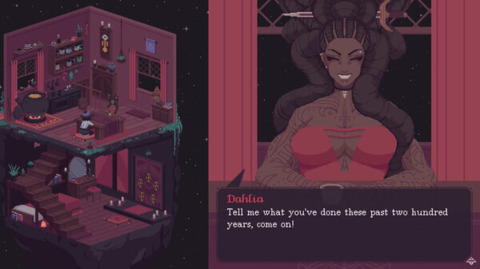
The witch symbolises feminine disruptive power, outside of the ordered hierarchies of patriarchy. She is temptation, and a threat. Her sexuality is as dangerous as her magic. We meet Fortuna in exile for having prophesied the doom of her coven. Desperate to escape and separated from her tarot deck, she makes a deal with an ancient otherworldly entity to reclaim her power. As the player, we combine symbolic elements to generate tarot cards for our deck. When we do a reading for another character, we pick a card to answer a question. Each card opens up a range of possible futures for us to choose from. If you picked a different card, different futures would be available to you, and the game would branch accordingly. The core game loop works so well that it almost hides the experimental design underneath. Fortuna’s predictions – for other people, for reality itself – come true, turning this game into a thunderously successful deconstruction of the very idea of video game protagonism. It is a lush, teeming swamp of branching possibilities. There is something alive here, inside its design depths. If you have a sense for it, you will feel it. Tonally it’s thankfully less high fantasy and more post-apocalyptic cosmic new weird, with refreshingly emotionally mature writing. PS – As a narrative designer, the expectation is that I am a tarot girlie. In fact, I am not – so don’t swerve this game even if you’re a card carrying member of the materialist Church of rationality, and roll your eyes whenever someone tells you about their Pisces Moon. Seriously. Do not let the irrelevancies of aesthetic preference deter you from letting yourself fall into this game’s rhythms.
1. 1000xResist

One of the first choices in this game is: This is not my body / This is not my skin / This is not my choice. The resultant dialogue line is gently varied, but that’s not the point. This design operates in the realm of poetic expressiveness rather than branching consequentiality. If Punchdrunk adapted Kazuo Ishiguro’s Never Let Me Go but as a video game rather than immersive theatre show, that video game would be 1000xresist. You spend your time moving through beautifully-lit viscerally arresting tableaus and mechanically traversing through time periods and exploded memories. There’s an assuredness to how the game teaches us its lexicons and grammars, and uses every affordance in unexpected but resonant conjunction to create emotional impact. The sunset visitor 斜陽過客, team comes from a mix of backgrounds in dance, theatre, film, music, visual art, and this expertise really shows. The story is equal parts high-concept sci-fi and diaspora narrative about the 2019 Hong Kong protests and intergenerational trauma, linked through themes of betrayal, inheritance, structural complicity, loss. It’s a lucid dream, hand crafted for you. It’s extraordinary. It’s something really very special. In a world plagued by extruded content emanating vacuously from every screen, we should be so lucky.
>>> Read full article>>>
Copyright for syndicated content belongs to the linked Source : Giant Bomb – https://www.giantbomb.com/articles/meghna-jayanths-top-10-games-of-2023/1100-6350/










